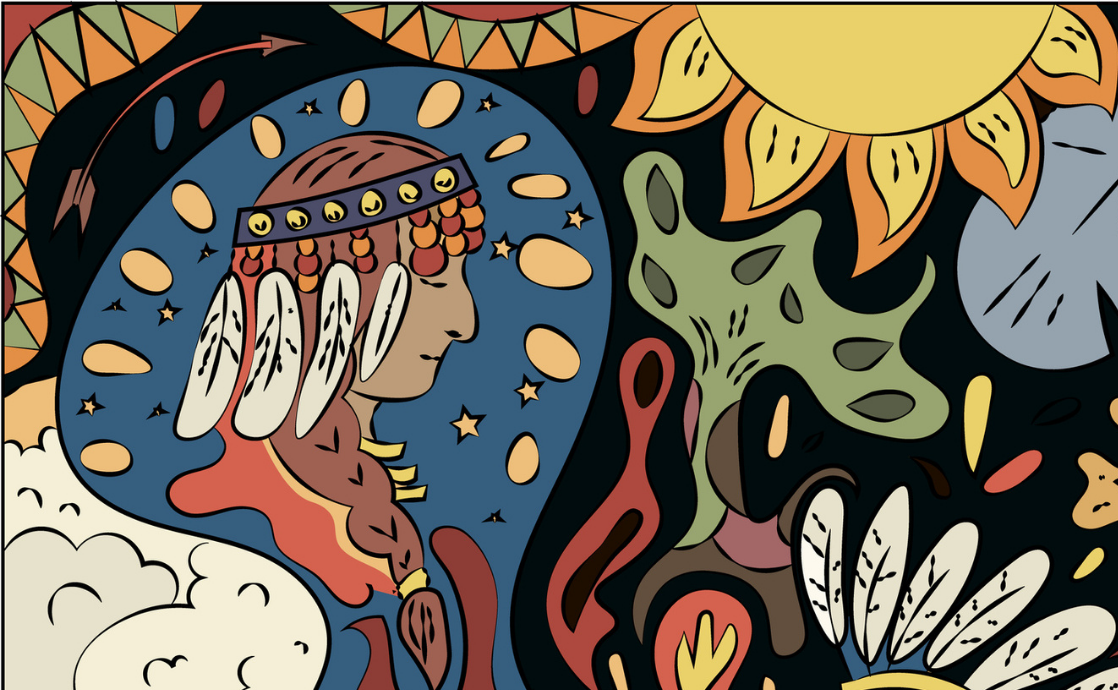The figure of Iyatiku, the Corn Woman, serves as a profound emblem within the rich tapestry of Indigenous spirituality and the teachings associated with the Bahá’í Faith. A cultural icon deeply rooted in Acoma Pueblo folklore, Iyatiku embodies the intricate relationship between humanity and the earth, encapsulating themes of sustenance, fertility, and divinity. In examining her significance, a dual lens of spiritual and ecological consciousness emerges, prompting a transformative shift in our perspectives on the divine and nature.
Iyatiku represents the essence of maize, an essential crop that forms the cornerstone of agricultural life for the Pueblo peoples. This reverence for the Corn Woman goes beyond mere sustenance; it is a holistic recognition of her role as a living symbol of life, growth, and nourishment. Within the teachings of the Bahá’í Faith, there is a certain alignment of principles that resonate with Iyatiku’s essence. The Bahá’í principles advocate for a global perspective where unity and the interconnectedness of life are paramount. As humanity grapples with the challenges posed by modernity, knowledge stemming from the wisdom of Iyatiku offers a vital antidote to the disconnection that often characterizes contemporary existence.
To truly understand the nuances of Iyatiku as a messenger of God, it is crucial to delve into her role as a guardian of the earth and agricultural sustainability. She is not merely a provider of corn; she is also a custodian of ecological balance. Her teachings inform a worldview that extends far beyond human needs, encouraging a symbiotic relationship with the environment. This framework invites individuals to adopt a stewardship mentality, echoing Bahá’í tenets of environmental responsibility and advocacy for the sustenance of human community. The notion of treating the earth as a sacred trust reflects both Indigenous wisdom and Bahá’í teachings, presenting a paradigmatic shift that intrigues and informs a contemporary audience.
Moreover, the character of Iyatiku encourages a discourse surrounding gender and divinity. Traditionally depicted as a female figure, she subverts patriarchal archetypes often associated with spiritual authority. In her, we find an inspiring model for rethinking gender roles within faith narratives. The Bahá’í Faith celebrates the equality of women and men as foundational to spiritual and social progress. Through this theological lens, Iyatiku becomes more than an Indigenous symbol; she burgeons into a potential catalyst for gender equity. This multifaceted identity not only piques curiosity but also inspires critical engagement with historical and religious norms.
The narrative of Iyatiku invites us to ponder a central question: How can we listen to the messages of the earth and her guardians? In this context, her wisdom resonates with teachings found in the Bahá’í Faith, especially those that emphasize consultation, reflection, and mindfulness in decision-making. As communities face myriad ecological crises, engaging with the stories and teachings of figures like Iyatiku draws attention to the inherent wisdom residing in Indigenous cultures. This cross-cultural conversation fosters a deeper understanding of ecological ethics, urging a paradigm shift in the way society approaches environmental stewardship.
The significance of Iyatiku also extends into the realm of community and collective identity. The Corn Woman is not simply a solitary entity; she embodies the interconnectedness of the Pueblo community and their ancestral traditions. Within Bahá’í thought, the principle of community building is paramount, highlighting that the promotion of unity is essential for social progress. Iyatiku serves as a communal figure, a touchstone that binds individuals to their heritage while simultaneously inviting them to engage with the evolving collective identity. This interplay between individual identity and communal belonging invites contemplation on how modern-day believers might navigate their spiritual journeys while remaining anchored in their communal roots.
Furthermore, as Iyatiku symbolizes growth and the cyclical nature of life, her narrative fosters a profound understanding of renewal and resilience. The cyclical planting and harvesting of corn resonate with the Bahá’í belief in the continual unfolding of divine revelation. Just as the earth undergoes seasons of dormancy and growth, so too does humanity experience spiritual cycles. In acknowledging these rhythms, adherents of the Bahá’í Faith can find motivation in the teachings of Iyatiku to cultivate personal and collective spiritual growth. This cyclic understanding offers an avenue for healing, emphasizing that resilience is not merely about survival, but about thriving in harmony with one’s surroundings.
The exploration of Iyatiku’s teachings also prompts a reassessment of consumption. As modern society grapples with industrialized agricultural practices and environmental degradation, the reverence for corn as epitomized by Iyatiku is a timely reminder of mindful consumption. The duality of giving and receiving, present within this narrative, encourages individual reflection on consumption habits. The Bahá’í ethos encourages not only the spiritual act of charity and sharing but also advocates for the sustainable use of resources. By invoking the teachings of Iyatiku, Bahá’í followers may cultivate a deeper consciousness of their choices and their impact on the world.
In conclusion, Iyatiku, the Corn Woman, serves as a profound Indigenous messenger of God, channeling vital teachings on ecological stewardship, spiritual equity, community, and resilience. Her story invites a reconceptualization of the divine, urging a transition from isolation to interconnectedness. Through a Bahá’í lens, these teachings prompt a reevaluation of how humanity interacts with nature and each other, fostering an intrigue that beckons further exploration. Engaging with the narratives surrounding Iyatiku not only resonates with the overarching tenets of the Bahá’í Faith but also embodies an urgent call to cultivate a more harmonious existence with the Earth and its inhabitants. In embracing these revelations, individuals are empowered to create a more inclusive and sustainable world, honoring the wisdom of both Indigenous and Bahá’í teachings alike.
